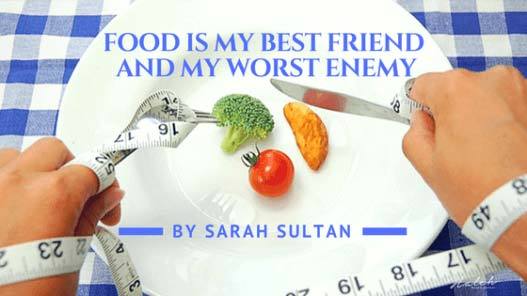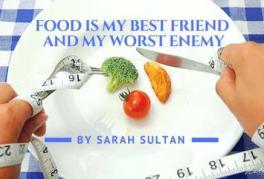[vc_row type=”in_container” scene_position=”center” text_color=”dark” text_align=”left” overlay_strength=”0.3″][vc_column column_padding=”no-extra-padding” column_padding_position=”all” background_color_opacity=”1″ background_hover_color_opacity=”1″ width=”1/1″][vc_column_text]
Food is My Best Friend and My Worst Enemy
You can’t skim through a magazine in any waiting room without coming across a page about weight loss, a page about recipes and a page of food advertisements. Instagram is replete with pictures of the food your friends ate for breakfast, lunch, and dinner while Facebook is filled with posts exclaiming, “I finally lost those last 10 pounds before the big day!” But what happens when this focus on food becomes a problem?
I just received an email from a concerned mother watching her daughter spiral downwards while she feels powerless to help her. She shared her concerns about her daughter’s tendency to stop eating when she feels depressed and lonely. This mother has witnessed her daughter lose a significant amount of weight within a short period of time and has watched her crawl further into her emotional shell each day. Why does this happen? Is it really a big deal since everybody diets anyway? What can you do to help?
Consider the story of a young girl: She gets straight As in school, plays volleyball and is applying to the most prestigious colleges. She has a good family life and has recently started to work toward losing weight. She has been complimented by everyone in her circle for her dramatic weight loss and has gotten much more positive attention from people recently. Her mother finds her “eating journal” on the kitchen counter one day and sees entries that become fewer each day. The last entry was yesterday’s: “Half an apple, 8 glasses of water and 3 baby carrots.”
Consider the story of this girl: She isn’t much of an academic but enjoys seeing her friends at school. She has dabbled in some drugs but never seriously got hooked. Her family can easily be called dysfunctional; her parents fight constantly, her mother is verbally abusive and her father is physically abusive. Her family constantly teases her about her weight so she recently started dieting and exercising every day. Sometimes, at night, she sneaks downstairs to eat everything she was craving throughout the day and then throws everything up. She thinks that she’s getting the best of both worlds by eating what she wants but not gaining weight.
A Life Threatening Disorder
Approximately 20 million females and 10 million males in the US have a clinically significant eating disorder at some point in their lifetime (Hudson et al., 2007). Some people severely underestimate the negative impact of eating disorders, particularly those that do not involve apparent and severe weight loss. However, eating disorders can result in physical and psychological complications that can take a great deal of medical and therapeutic treatment to heal. All eating disorders can lead to irreversible and even life-threatening health problems including heart disease, bone loss, stunted growth, infertility, and kidney damage.
Islamically, we have been encouraged to care for ourselves physically. The Prophet (sala Allahu ‘alayhi wa salam) said, “Your body has a right upon you.” (al-Bukhari) We know how easy it can be to develop unhealthy eating habits; therefore, the Prophet (sala Allahu ‘alayhi wa salam) encouraged moderation when he said, “A man does not fill any vessel worse than his stomach… one-third [should be] for his food, one-third for his drink and one-third for his air.” (at-Tirmidhi) Allah (subhanahu wa ta’ala) encourages moderation when He says, “And He enforced the balance. That you exceed not the bounds; but observe the balance strictly, and fall not short thereof.” (55:7-9) This applies the physical balance as much as it does to the spiritual arena of our lives.
Why do people turn toward food for comfort?
Why do others shun food? Food and weight are such a sensitive topic for most people, which has resulted in unhealthy eating habits becoming very common. Our culture promotes a thin ideal; attractiveness is equated with thinness. Adolescents, although not exclusively, are especially impacted by the media’s unrealistic portrayals of bodies. Eating disorders, as well as the issues and thoughts that contribute to them, are much more complicated than people often think. People often think that those with eating disorders are simply vain and narcissistic; however, the underlying reason behind the extreme diets and obsession over their bodies is due to an attempt to deal with overwhelming emotions.
Feelings of shame, anxiety, and powerlessness can lead people to try to gain control of their lives in very unhealthy ways. Rigid thinking, perfectionism and a need for control can also impact a person’s eating habits and are risk factors of developing an eating disorder. Many of my clients have taken pride in being able to resist the temptation of food being placed in front of them. Most of them have struggled to regulate their emotions and have said things like, “When I’m anxious, I feel like I can’t make myself feel normal again. I feel like I’m out of control. So I stop eating and feel like I got a little bit of control back again.”
How can you help a loved one?
What can you do as a friend or family member of someone who may be suffering from an eating disorder? I remember one client I worked with whose parents, when asked about their goals and concerns for their daughter in therapy, said, “I want her to start eating. We keep telling her to eat and she says no.” This family required a lot of education about the root of eating disorders to realize that it was not as simple as their daughter simply being able to choose to gnaw away at a piece of chicken. What they didn’t realize was that her eating disorder was their daughter’s constant companion. She viewed her anorexia as a friend but didn’t realize that this “friend” was slowly killing her. Her thoughts constantly told her that if she just lost 5 more pounds, everything would be better; she would have more friends, wouldn’t feel anxious in the cafeteria at lunchtime and would be considered attractive.
As friends and family of those who suffer from eating disorders, realize that you can help:
- Encourage them to seek out professional help. Eating disorders are not simply about eating; they involve complex thoughts and emotions and should be addressed through therapy.
- Avoid critical statements such as, “You look like a skeleton!” Also, avoid accusatory or blaming statements such as, “How can you be so inconsiderate?” or “You’re acting irresponsibly.” This will only cause them to become defensive. Keep in mind the hadith of the Prophet Muhammad (sala Allahu ‘alayhi wa salam), “Whoever is deprived of gentleness is deprived of all good.” (Muslim)
- Focus on your relationship with your loved one, rather than on food and weight. Share how important she is to you and that you only what is best for her. When a young man approached the Prophet (sala Allahu ‘alayhi wa salam) to seek permission to commit adultery, the Prophet (sala Allahu ‘alayhi wa salam) used relationships in this man’s life to illustrate the gravity of what he was requesting. While others reproached him, the Prophet said, “Come closer.” When the young man drew nearer to the Prophet and sat down, the Prophet asked him: “Would you like it for your mother?” The man answered, “No, by Allah. May Allah make me a protection for you!” The Prophet commented, “People also do not like it for their mothers.” The Prophet added, “Would you like it for your daughter?” Again, the young man answered negatively. So, the Prophet said, “People too would not love it for their daughters” Further, the Prophet asked, “Would you like it for your sister?” The Prophet received the same answer and made the same comment. The Prophet then placed his hand on the young man and prayed for him, “O Allah, forgive his sins, purify his heart, and protect his chastity.” (Al-Albani)
- Focus on your feelings using “I” statements. Try saying, “I feel worried when I hear you throwing up” or “I feel scared when I see how little you’ve eaten these past few days.” This non-threatening approach allows people to feel more open to hearing your concerns and opens the lines of communication. When we get in touch with our emotions and share them, we create a safe space for others to also get in touch with their feelings.
- Avoid focusing on their appearance. People who suffer from eating disorders are already hyper-aware of their bodies. Comments on weight and appearance feed into this obsession with body image.
- Remember that people who suffer from eating disorders struggle with feeling a lack of control in their lives. Therefore, avoid power struggles such as trying to force your loved one to eat. For many Muslims with eating disorders, they mention that Ramadan iftaars are particularly difficult for them due to feeling pressured to eat more than they want to so try to avoid adding more pressure.
Mindful Eating
Although we do not often think of it this way, eating can be a form of worshipping Allah (subhanahu wa ta’ala), particularly for those working to overcome eating disorders to lead a healthier lifestyle. This change in the way one thinks about food can be healing in a very powerful way. How can food be an enemy if it’s a blessing from Allah? Healthy eating can be a means of pleasing Allah (subhanahu wa ta’ala). When viewed this way, gaining healthy eating habits suddenly become less scary. You are now not only thinking about your relationship with food but your relationship with Allah (subhanahu wa ta’ala) as well. Consider the hadith of the Prophet (sala Allahu ‘alayhi wa salam), “Allah is pleased with His slave when he eats something and praises Him for it, or drinks something and praises Him for it.” (Muslim) Furthermore, Allah (subhanahu wa ta’ala) commands us, “Eat of the good things, which We have provided for you.” (2:173) Health is a blessing from Allah (subhanahu wa ta’ala), which we often do not appreciate until we no longer have it. The Prophet Muhammad (sala Allahu ‘alayhi wa salam) mounted the pulpit, wept and said, “Ask Allah for forgiveness and health; for after being granted certainty, one is given nothing better than health.” (at-Tirmidhi) View every step you take toward gaining a healthier relationship with food as a means of also gaining a stronger relationship with Allah (subhanahu wa ta’ala) and continue striving toward it.
*For more information, you can visit the National Eating Disorder Association website by clicking here. You can always schedule a session with Haleh and her trusted team as well. Click here for more information.[/vc_column_text][/vc_column][/vc_row]






0 Comments